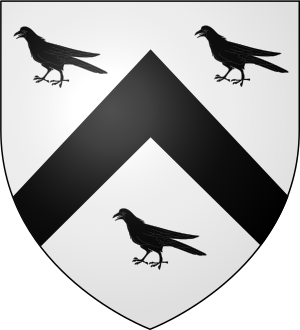House of Rheged facts for kids
The House of Rheged was a family of kings who ruled the ancient Brittonic Kingdom of Rheged. This royal family is also sometimes called the House of Rhun. Their story begins with a famous leader named Coel Hen. His family members were often known as the Coeling.
Important members of this family include Urien, who was a powerful King of Rheged. His son, Sir Ywain, is even mentioned as a Knight of the Round Table in the tales of Arthurian legend.
Coel Hen ruled much of Northern England after the fall of the Western Roman Empire. His lands were later divided among his children. This led to his great-grandson, Meirchion Gul, becoming the first king to rule only Rheged in the late 400s. The family continued to rule until Princess Rhiainfellt married King Oswiu of Northumbria. After this marriage, Rheged became part of the Anglic Kingdom of Northumbria.
Contents
What Does "Rheged" Mean?
The exact meaning of the name Rheged is a bit of a puzzle. One idea is that it comes from an old Brittonic word. It might combine rö-, which means "great", and cę:d, meaning "wood" or "forest". If this is true, the name could mean "Great Wood".
Another idea is that the first part, rag-, means "next to" or "opposite". So, it could mean "Next to the Wood". Some also think it might come from the word reg, which means "generosity".
The History of Rheged's Kings
It's possible that either Gorwst Letlwm or Ceneu ruled Rheged very early on. However, it is more likely that Meirchion Gul was the first king specifically of this area. The kingdom was probably passed down to Cynfarch Oer. Some old Welsh laws suggest his brother, Elidyr Lydanwyn, might have ruled first.
Cynfarch's nickname 'oer' meant 'cold' but is better understood as 'unwelcoming'. His family remembered him well. They were even called the Cynferchyn in his honor.
King Urien Rheged
Cynfarch's son, Urien Rheged, is the most famous king from the House of Rheged. He fought many battles against the Anglo-Saxons. These battles, like the Battle of Gwen Ystrad and the Battle of Alt Clut Ford, are celebrated in old poems. These poems were written by Taliesin and are found in the Book of Taliesin.
King Urien joined forces with other northern kings. These included Rhydderch Hael of Strathclyde, and two other leaders from Coel's family: Gwallog mab Llaenog and Morgant Bwlch. Together, they defeated the Angles and surrounded them at Lindisfarne.
However, an old book called the Historia Brittonum says that Urien was killed. It claims that Morgant Bwlch was jealous of Urien's power. A man named Llofan Llaf Difo is said to have killed Urien by a small river.
The End of the Kingdom
King Urien had at least five sons, including Owain, Rhiwallon, Elffin, Rhun 'Baladr Bras', and Pasgen. His oldest son, Owain, became king after him.
Later, the royal line continued through Rhun's son, Royth (Rhaith). The kingdom of Rheged eventually ended when Royth's daughter, Princess Rhiainfellt, married King Oswiu of Northumbria. After this marriage, Rheged became part of the larger Kingdom of Northumbria.
Southern Rheged
There is another family tree for a group of rulers who might have been kings. These rulers came from Cynfarch Oer's brother, Elidir Lydanwyn. According to an old text called Bonedd Gwŷr y Gogledd, Elidir's son, Llywarch Hen, was a ruler in North Britain in the 500s.
Llywarch was forced out of his land because of fighting among the princes after Urien's death. When he was older, he might have lived in Powys. Some poems call Llywarch the king of South Rheged. Other poems call him the king of Argoed. This suggests that South Rheged and Argoed might have been the same place.
Because of this, some historians think that Rheged might have been split into northern and southern parts. The connections of Llywarch's family and Urien's family to Powys suggest that their original home might have been in the area of modern Lancashire.
Kings of Rheged
Here are some of the known rulers of Rheged:
- Meirchion Gul
- Elidyr Lydanwyn?
- Cynfarch Oer
- Urien Rheged
- Owain?
- Riwallon?
- Elffin?
- Rhun?
- Royth Rheged


